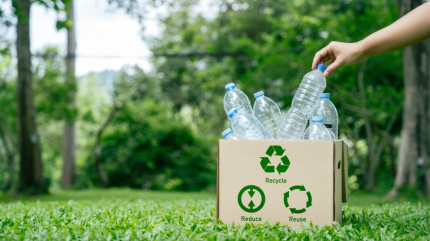
The Hungarian Competition Authority has “initiated proceedings” against multiple beverage producers, including Coca-Cola HBC over advertising claims that may be ill-founded relating to environmental packaging credentials.
The watchdog is investigating Coca-Cola HBC Magyarország (Coca-Cola HBC Hungary), Coca-Cola Magyarország Szolgáltató (Coca-Cola Hungarian Services) and The Coca-Cola Company, as well as Hungarian bottled water producers Fonte Natura and Szentkirályi Magyarország.
Coca-Cola HBC Magyarország, Coca-Cola Magyarország Szolgáltató and The Coca-Cola Co. have been accused of having “likely deceived consumers” by claiming that PET bottles of Coca-Cola Co.’s Hungarian Naturaqua brand were 100% recyclable.
Fonte Natura and Szentkirályi Magyarország are also being investigated over both claiming that they had 100% recyclable bottles for their mineral waters and “flavoured drinks”.
“The initiation of competition supervision procedures does not mean that the concerned enterprises have committed the violations. The procedures are aimed at clarifying the facts and thereby proving the alleged violations,” The Hungarian Competition Authority said in a statement.
The watchdog added that the “objectionable” advertising claims could be “unfounded” as the companies probably do not have sufficient evidence to prove the environmental benefits of the packaging.
How well do you really know your competitors?
Access the most comprehensive Company Profiles on the market, powered by GlobalData. Save hours of research. Gain competitive edge.

Thank you!
Your download email will arrive shortly
Not ready to buy yet? Download a free sample
We are confident about the unique quality of our Company Profiles. However, we want you to make the most beneficial decision for your business, so we offer a free sample that you can download by submitting the below form
By GlobalDataA spokesperson for Coca-Cola HBC told Just Drinks: “We refute the claims from the Hungarian Competition Authority that we have misled consumers with the wording on our labels. We only communicate messages on our packaging that can be substantiated, with any relevant qualifications clearly displayed.
“The fact that the bottle is 100% recyclable is also proved by the introduction of the Deposit Return Scheme this year in Hungary. To give PET bottles another life, consumers are returning around four to five million bottles a day through 3,000 reverse vending machines installed throughout the country. This is a result of a joint effort by the system operator MOHU, retailers and manufacturers, which enable Hungarian recycling companies to close the loop on PET packaging circularity.
The group added that: “We are working with the authorities to share the facts of the situation and to resolve the matter quickly.”
The investigation has a time span of three months, which can be extended by four months if needed.
Last year, the European Commission proposed “common criteria” businesses should follow to tackle false ‘green’ claims made on products sold in the EU.
Under the plans, when companies choose to make an environment-related claim about their product or service, they will have to “respect minimum norms on how they substantiate these claims and how they communicate them”, Brussels said in a statement.
In the spotlight are specific claims and the “proliferation” of labels being used on products, the Commission said.
Brussels estimates there are at least 230 different labels in place across the bloc but says “almost half” of the verification processes behind those labels are “either weak or not carried out”.
Last year, Coca-Cola HBC, Nestlé and Danone were all hit with a legal complaint from the Bureau Européen des Unions de Consommateurs (BEUC), Environmental Coalition on Standards (ECOS) and environmental non-profit ClientEarth over greenwashing allegations around their water bottle production.



